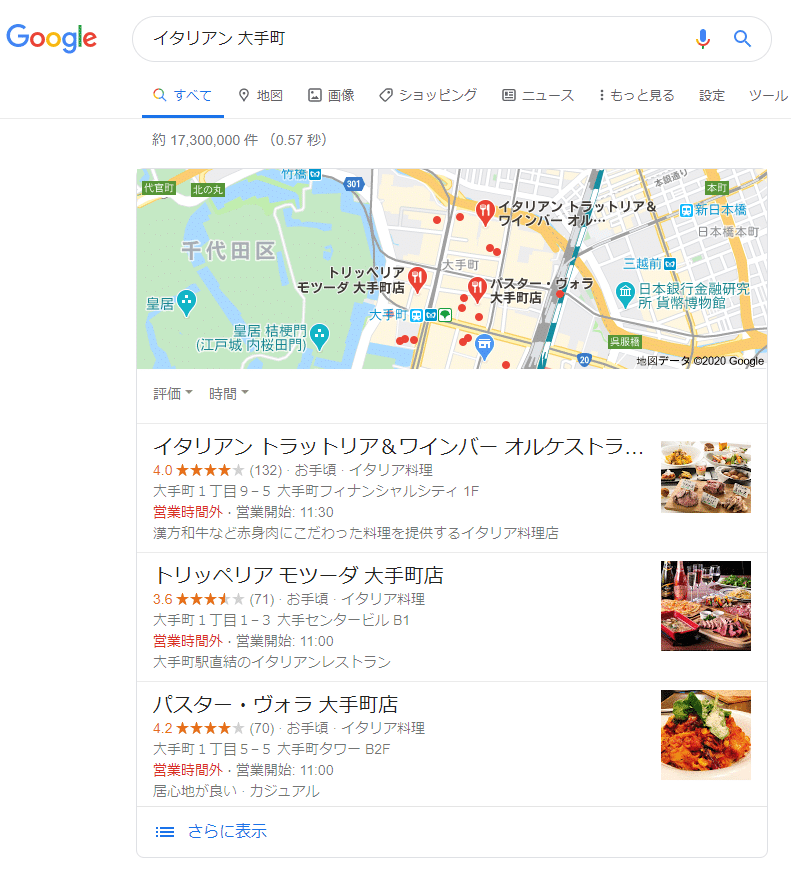Key Points to Check in a Business Outsourcing Contract for MEO Measures

Recently, more and more people are turning to Google search first when looking for new stores or services. In particular, when searching for restaurants or hospitals near one’s home or office, many people use their smartphones to find nearby locations on Google Maps.
For businesses, having their store’s detailed information prominently displayed on Google Maps can greatly increase the likelihood of attracting customers. As a result, there is a growing demand for MEO (Map Engine Optimization) strategies to achieve higher visibility on Google Maps.
In this article, we will discuss the service agreement that is signed between the client and the professional agency conducting the MEO strategies.
What is MEO?
When you’re out and about, you might use your smartphone to search for nearby restaurants. When you search for businesses on Google Search or Google Maps, a feature displays a list of detailed information about nearby businesses along with a map, as shown below.

This is a feature of Google My Business, a service for businesses provided by Google. It prioritizes the display of businesses that have registered with the service and are relevant to the search keywords, are close to the current location, or are well-known.
Especially when you search on Google with “place name + industry”, the list of Google Maps and business information is displayed at the top of the search results. Therefore, if you can display your business in this list, there is a high possibility that it will directly lead to an increase in sales.
The measures to display businesses at the top of Google Maps are called MEO. MEO stands for Map Engine Optimization. The contract that businesses sign when they commission MEO measures to a specialist is the MEO Service Contract that we will explain this time. For contracts related to posting advertisements on Google search result screens or third-party websites, please refer to the following article for a detailed explanation.
https://monolith.law/corporate/explanation-of-internet-advertising-agency-contract[ja]
Key Points in MEO Service Outsourcing Contract

When outsourcing MEO measures to a specialist, an outsourcing contract is created. In the following, we will explain the key clauses in the MEO service outsourcing contract. In the clause examples mentioned below, “Party A” refers to the store, etc. that outsources the MEO measures, and “Party B” refers to the specialist. For more details on general outsourcing contracts, please refer to the article below.
https://monolith.law/corporate/regulation-of-outsourcing-contract[ja]
Provisions Regarding the Scope of Work
Article X (Scope of Work)
The Party A entrusts to Party B the task of implementing measures, as per the appendix, that are deemed effective for improving the ranking of the designated stores, etc. on Google Maps (hereinafter referred to as “the Work”). Party A accepts this commission.
What’s crucial in a MEO (Map Engine Optimization) contract is to specifically define the tasks to be performed by the MEO service provider. Key points in MEO work include specifying what exactly is meant by “improving” the ranking, which is the goal of the measures, and clearly stating the keywords aimed for higher display. These are often specified in an appendix attached to the contract, as in the clause proposal above. A clear way to define improvement would be to set a target such as “ranked X or higher” for the keywords targeted by the MEO measures.
Regarding the ranking, in the case of Google, search results optimized for each viewer are displayed by analyzing the viewer’s attributes and search history. This is called personalized search. Therefore, it is essential to check the ranking in a state where optimization of search results for each viewer, known as “incognito mode”, is not performed. Of course, it is also important to thoroughly explain this mechanism to the stores, etc. that entrust the MEO measures.
Provisions Regarding Remuneration Payment
There are two types of remuneration for MEO (Map Engine Optimization) services: performance-based remuneration, which is paid upon achieving certain results, and fixed remuneration, which is paid regardless of the results achieved. Below, we will explain these two types separately.
In the case of performance-based remuneration
Article X (Payment of Performance-based Remuneration)
The Party A shall pay to the Party B a remuneration calculated by multiplying a certain amount (including consumption tax) by the number of days when one or more of the keywords targeted for MEO measures, as specified in the appendix, are displayed within the top X positions in the search results at the agreed location on Google Map (hereinafter referred to as “ranking”).
In the case of performance-based remuneration, it is most important to clearly define the results that trigger the payment of remuneration. The clause above sets the condition for remuneration to be the display of one or more of the multiple keywords targeted for MEO measures within the top X positions in the search results. However, if the keywords targeted for MEO measures include long-tail keywords that are relatively easy to rank and have low competition and access numbers, performance-based remuneration may be generated even if the actual number of store visits does not increase. Therefore, it is important to explain to the client before the contract that the purpose of MEO measures is not directly to increase the number of store visits. Also, as we will explain later, it may be worth considering stipulating in the clause on disclaimers that achieving a high ranking does not necessarily lead to an increase in store visits, etc.
Furthermore, search results can vary depending on the location of the search. Therefore, it is also important to clearly define the measurement location. The clause above refers to an “agreed location”, but it would be better to clearly define the location in writing if possible.
In the case of fixed remuneration
Article X (Payment of Fixed Remuneration)
The Party A shall pay to the Party B a remuneration calculated by multiplying a certain amount (including consumption tax) by the number of months of the contract period as defined in Article X.
In the case of fixed remuneration, there are methods such as receiving the remuneration for the entire period at the time of the contract, as in the clause above, or receiving the monthly remuneration at the end of each month. In the case of fixed remuneration, there is less chance of trouble with the client compared to performance-based remuneration. However, if you receive a monthly remuneration during the contract period, it is necessary to define how to handle the remuneration in case of termination during the contract period. In this article, we define this point in the clause on the contract period, so please refer to it.
Clause on Disclaimers

Article X (Disclaimer)
1. Party A does not guarantee to Party B that the number of visitors or sales at Party A’s stores, etc., will increase as a result of this project.
2. Party B shall not be liable for any damages to Party A if the ranking of Party B’s stores, etc., on Google Maps does not improve or decreases compared to before the implementation of this project.
3. If the payment of Party A’s remuneration to Party B is based on performance, Party B shall not bear any burden of proof that the achievement of the higher ranking, which is a condition for the generation of the remuneration, is due to its own work.
The clause on disclaimers is intended to specify in the contract in advance the issues that are likely to cause trouble between the client and the MEO service provider. The first clause in the example stipulates that the ultimate goal of MEO measures is to achieve a higher ranking on Google Maps, and it does not guarantee that this will necessarily increase the sales of stores, etc.
The second clause in the example cautions that just because MEO measures have been taken, it does not necessarily mean that a higher ranking can be achieved on Google Maps. Whether or not a store is ranked higher on Google Maps is determined by Google’s algorithm, and since many aspects of how this is determined are not disclosed, it is natural that an MEO service provider cannot guarantee the results.
The third clause in the example stipulates that in a performance-based contract, if the higher ranking that is a condition for the generation of the remuneration is achieved, it is not possible to prove whether this is due to chance or the result of MEO measures. As mentioned earlier, not all of Google’s algorithms that determine the ranking are disclosed. The third clause can be said to clarify that as long as the conditions for the generation of the remuneration are met, regardless of whether the result is due to MEO measures, the MEO service provider can receive the performance-based remuneration.
While all of these clauses are natural from the perspective of an MEO service provider, they can easily lead to complaints later on if the client is not familiar with how Google search works. Therefore, it is important to explain these points thoroughly to the client before the contract is signed, in addition to stipulating them as disclaimers.
Clause Regarding Contract Term

Article X (Contract Term)
1. The term of this contract shall be X months from the date of conclusion of this contract.
2. If Party A terminates this contract within the contract term, Party A shall pay to Party B the remuneration that would have been incurred during the remaining term.
In the case of a contract for MEO (Marketing Effectiveness Optimization) services, it is essential to define the treatment in case of termination during the contract term, except when a lump-sum fixed remuneration is received at the time of contract. This is because, even if MEO measures are implemented, it is said that it usually takes at least 3 months, and often more than 6 months, for the effects to appear due to the mechanism of Google search. Therefore, if the contract is terminated early during the contract term, there is a possibility that the MEO service provider may not be able to receive sufficient remuneration for the work.
Especially in the case of clients who are not familiar with the mechanism of Google search, they tend to expect immediate results, and may terminate the contract early if they do not see any effects. While it is certainly necessary to explain in advance that the effects of MEO measures do not appear immediately, it is also important to stipulate, as in the proposed clause, that the MEO service provider can receive the full amount of remuneration that would have been earned during the contract term, even if the contract is terminated during the contract term.
Please note that the proposed clause mainly assumes a fixed remuneration type. In the case of a performance-based remuneration type, it is necessary to stipulate that the provisions regarding performance-based remuneration remain valid even after termination, so that remuneration can be received even after termination, or to prohibit termination during the contract term. Please note that the latter clause prohibiting termination during the contract term, although not very common, may be deemed invalid under Article 10 of the Japanese Consumer Contract Act if the client is not a business operator.
Summary
As the number of people using Google Maps on a daily basis increases, so does the number of stores and other businesses that require MEO (Map Engine Optimization) measures. However, since MEO is a relatively new concept, there isn’t a wealth of practical experience, and it’s difficult to say that the general public fully understands it. Therefore, when undertaking MEO tasks, it’s important to carefully explain the contract details to the client and clearly specify potential trouble points in the contract.
Introduction to Contract Creation and Review Services by Our Firm
At Monolis Law Firm, as a legal firm with strengths in IT, Internet, and business, we offer a variety of services including the creation and review of various contracts, not limited to MEO strategy outsourcing contracts, to our advisory and client companies. If you are interested, please see the details below.





















